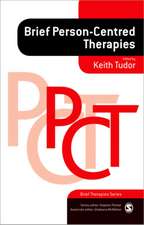CBT Supervision
Autor Sarah Corrie, David A. Laneen Limba Engleză Paperback – 23 mar 2015
These are some of the questions addressed in this practical new book, examining what it takes to be a competent and confident CBT supervisor. Using the authors' unique framework of learning – the PURE Supervision Flower – the book equips trainees with the skills and competencies needed to #strong
/strong#repare for, undertake, refine and enhance supervision practice across a wide range of settings.
Structured around the PURE Supervision Flower, the book is divided into four parts:
#strong
/strong#reparing for Supervision explores how to establish an effective and ethical base from which supervision can occur
Undertaking Supervision focuses on the practical delivery of CBT Supervision
Refining Supervision offers insights into managing the supervisory process and relationship
Enhancing Supervision hones competencies by considering complex ethical challenges and CPD.
Packed with activities, tips, case studies and reflective questions to help consolidate learning, this is essential reading for CBT practitioners training in and already providing supervision across a range of settings.
Preț: 341.80 lei
Nou
Puncte Express: 513
Preț estimativ în valută:
65.41€ • 67.57$ • 54.44£
65.41€ • 67.57$ • 54.44£
Carte disponibilă
Livrare economică 04-18 martie
Livrare express 15-21 februarie pentru 33.17 lei
Preluare comenzi: 021 569.72.76
Specificații
ISBN-13: 9781446266397
ISBN-10: 1446266397
Pagini: 256
Dimensiuni: 170 x 242 x 17 mm
Greutate: 0.41 kg
Ediția:1
Editura: SAGE Publications
Colecția Sage Publications Ltd
Locul publicării:London, United Kingdom
ISBN-10: 1446266397
Pagini: 256
Dimensiuni: 170 x 242 x 17 mm
Greutate: 0.41 kg
Ediția:1
Editura: SAGE Publications
Colecția Sage Publications Ltd
Locul publicării:London, United Kingdom
Recenzii
This terrific book is comprehensive, evidence-based, and practical. Geared toward both supervisors and supervisees, it provides a number of important learning exercises to encourage active reflection. The case studies help the reader transfer what they are learning to real-life situations. I highly recommend this book to trainees, therapists who need to improve their skills in self-reflection, and to supervisors.
Corrie and Lane’s CBT Supervision is a well-researched, well-organized, thorough, practical workbook that will be a valuable resource for clinical CBT supervisors at all levels of experience. This volume’s supervisory case studies, chapter-by-chapter learning activities, and “tips for supervisees” make this volume ideal for a graduate seminar in learning to become a CBT supervisor. More experienced supervisors will benefit greatly from the authors’ wise suggestions in handling challenges and dilemmas in supervision, and from their emphasis on supervisor self-reflection, self-care, and lifelong professional and personal growth. CBT Supervision is at once a great asset to the field.
Ever wanted some well-organised supervision for your supervision? Would you welcome some guidance in your role as a supervisee? Then this exceptionally clear and systematic book is for you! What’s more, it tackles the core tasks of CBT supervision from a well-developed understanding of the nature of CBT, continuing the reflexive tradition. For example, the reader is expected to reflect carefully on the central questions raised, while the realistic and engaging case studies are used to pose dilemmas and prompt procedural thinking. Feedback is effectively provided in the form of the authors’ responses to the dilemmas.
This is a highly practical ‘nuts and bolts’ guide to CBT supervision, optimistic and empowering. Unlike many competitors, ‘CBT supervision’ keeps theory and research details to an absolute minimum, sticking firmly to established supervision practices and sensible recommendations (for both supervisors and supervisees), based on the authors’ extensive supervisory experience. It is written with exceptional clarity and systematically covers all the bases. In sum, this is a highly informative, soundly based, exceptionally practical guide to CBT supervision. It is all the more welcome given the pressing need to tackle CBT supervision in a professional manner.
The authors have produced something new, fresh and original. For the first time a book that focusses on how to effectively practise cognitive behavioural supervision. This text is an essential practice and professional development aid for both new and experienced cognitive behavioural supervisors. Each chapter takes the reader through how to prepare, undertake, refine and enhance their supervision, illustrated with examples and reflective activities – is there any other CBT supervision book that makes understandable the complexity of supervision? This book won’t just be on my book shelf it will be on my desk as I will be turning to it time and time again as a supervisor of clinicians and other supervisors and as academic responsible for the delivery of supervision workshops.
Corrie and Lane’s CBT Supervision is a well-researched, well-organized, thorough, practical workbook that will be a valuable resource for clinical CBT supervisors at all levels of experience. This volume’s supervisory case studies, chapter-by-chapter learning activities, and “tips for supervisees” make this volume ideal for a graduate seminar in learning to become a CBT supervisor. More experienced supervisors will benefit greatly from the authors’ wise suggestions in handling challenges and dilemmas in supervision, and from their emphasis on supervisor self-reflection, self-care, and lifelong professional and personal growth. CBT Supervision is at once a great asset to the field.
Ever wanted some well-organised supervision for your supervision? Would you welcome some guidance in your role as a supervisee? Then this exceptionally clear and systematic book is for you! What’s more, it tackles the core tasks of CBT supervision from a well-developed understanding of the nature of CBT, continuing the reflexive tradition. For example, the reader is expected to reflect carefully on the central questions raised, while the realistic and engaging case studies are used to pose dilemmas and prompt procedural thinking. Feedback is effectively provided in the form of the authors’ responses to the dilemmas.
This is a highly practical ‘nuts and bolts’ guide to CBT supervision, optimistic and empowering. Unlike many competitors, ‘CBT supervision’ keeps theory and research details to an absolute minimum, sticking firmly to established supervision practices and sensible recommendations (for both supervisors and supervisees), based on the authors’ extensive supervisory experience. It is written with exceptional clarity and systematically covers all the bases. In sum, this is a highly informative, soundly based, exceptionally practical guide to CBT supervision. It is all the more welcome given the pressing need to tackle CBT supervision in a professional manner.
The authors have produced something new, fresh and original. For the first time a book that focusses on how to effectively practise cognitive behavioural supervision. This text is an essential practice and professional development aid for both new and experienced cognitive behavioural supervisors. Each chapter takes the reader through how to prepare, undertake, refine and enhance their supervision, illustrated with examples and reflective activities – is there any other CBT supervision book that makes understandable the complexity of supervision? This book won’t just be on my book shelf it will be on my desk as I will be turning to it time and time again as a supervisor of clinicians and other supervisors and as academic responsible for the delivery of supervision workshops.
Cuprins
Introduction
Preparing for Supervision
Know your Brand: Identifying your Position on the CBT Landscape
Understand the Context: Identifying your Key Stakeholders
Negotiate a Contract: Preparing the Terms of the Learning Agreement
Undertaking Supervision
Structure your Sessions: Creating the Architecture of CBT Supervision
Choose your Interventions: Selecting Methods to Enhance Proficiency
Assess Competence: Developing an Effective Approach
Refining Supervision
Develop the Relationship: Using the Supervisory Alliance as a Source of Learning
Manage Power: Creating a Balanced Relationship within Supervision
Resolve Resistance and Ruptures: Working with Relational Challenges
Enhancing Supervision
Address Ethical Dilemmas: Developing a Coherent Approach
Assess your Supervisory Skill: Building Methods to Evaluate Practice
Increase Your Expertise: Developing and Looking After the Self
Appendices
Preparing for Supervision
Know your Brand: Identifying your Position on the CBT Landscape
Understand the Context: Identifying your Key Stakeholders
Negotiate a Contract: Preparing the Terms of the Learning Agreement
Undertaking Supervision
Structure your Sessions: Creating the Architecture of CBT Supervision
Choose your Interventions: Selecting Methods to Enhance Proficiency
Assess Competence: Developing an Effective Approach
Refining Supervision
Develop the Relationship: Using the Supervisory Alliance as a Source of Learning
Manage Power: Creating a Balanced Relationship within Supervision
Resolve Resistance and Ruptures: Working with Relational Challenges
Enhancing Supervision
Address Ethical Dilemmas: Developing a Coherent Approach
Assess your Supervisory Skill: Building Methods to Evaluate Practice
Increase Your Expertise: Developing and Looking After the Self
Appendices
Notă biografică
Sarah Corrie is a Consultant Clinical Psychologist and Visiting Professor at Middlesex University.
Descriere
Examining what it takes to be a competent and confident CBT supervisor and using the authors' unique framework of learning - the PURE Supervision Flower - this book equips trainees with the skills and competencies needed to Prepare for, Undertake, Refine and Enhance supervision practice across a wide range of settings.










